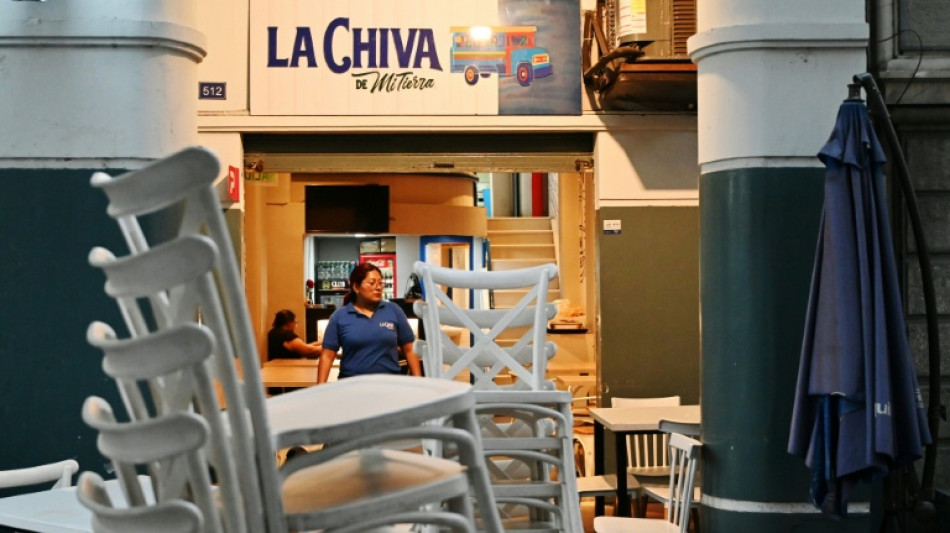
-
 Showtime for Venice Film Festival, with monsters, aliens, Clooney and Roberts
Showtime for Venice Film Festival, with monsters, aliens, Clooney and Roberts
-
Thai woman jailed for 43 years for lese-majeste freed
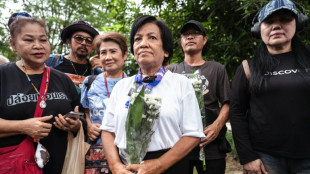
-
 What is swatting? Shooting hoaxes target campuses across US
What is swatting? Shooting hoaxes target campuses across US
-
Row over Bosnia's Jewish treasure raising funds for Gaza
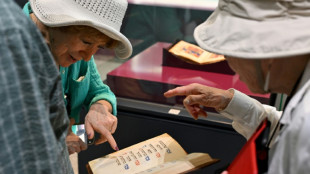
-
 Police search Australian bush for gunman after two officers killed
Police search Australian bush for gunman after two officers killed
-
NZ rugby player who suffered multiple concussions dies aged 39

-
 Former Australian Rules player comes out as bisexual in first
Former Australian Rules player comes out as bisexual in first
-
French, German, Polish leaders to visit Moldova in show of force in face of Russia

-
 US tariffs on Indian goods double to 50% over Russian oil purchases
US tariffs on Indian goods double to 50% over Russian oil purchases
-
Feudal warlord statue beheaded in Japan
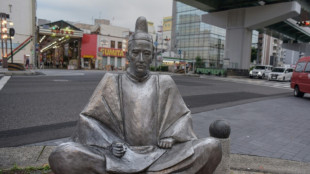
-
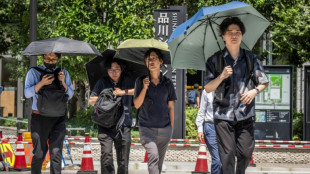 Tokyo logs record 10 days of 35C or more
Tokyo logs record 10 days of 35C or more
-
Sinner, Swiatek romp through at US Open as Gauff struggles

-
 Brazil to face South Korea, Japan in World Cup build-up
Brazil to face South Korea, Japan in World Cup build-up
-
Asian markets diverge with eyes on Nvidia earnings

-
 Osaka out to recapture sparkle at US Open
Osaka out to recapture sparkle at US Open
-
China's rulers push party role before WWII anniversary
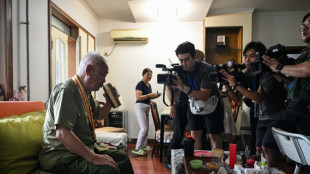
-
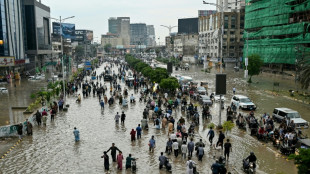 Pakistan's monsoon misery: nature's fury, man's mistake
Pakistan's monsoon misery: nature's fury, man's mistake
-
SpaceX answers critics with successful Starship test flight

-
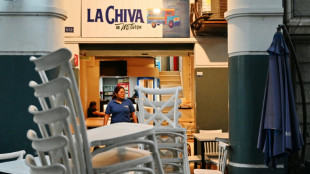 Nightlife falls silent as Ecuador's narco gangs take charge
Nightlife falls silent as Ecuador's narco gangs take charge
-
Unnamed skeletons? US museum at center of ethical debate
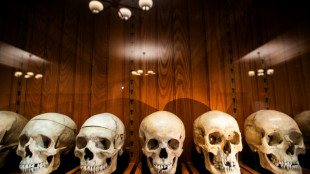
-
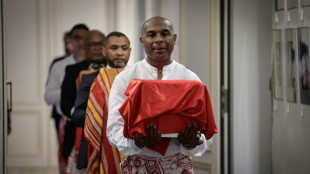 France returns skull of beheaded king to Madagascar
France returns skull of beheaded king to Madagascar
-
SpaceX's Starship megarocket launches on latest test flight

-
 US restaurant chain Cracker Barrel cracks, revives old logo
US restaurant chain Cracker Barrel cracks, revives old logo
-
Brazil's Bolsonaro placed under 24-hour watch ahead of coup trial verdict

-
 Taylor-Travis love story: 5 things to know
Taylor-Travis love story: 5 things to know
-
Sports world congratulates Swift and Kelce on engagement

-
 Wolves inflict more woe on West Ham, Leeds crash out League Cup
Wolves inflict more woe on West Ham, Leeds crash out League Cup
-
Venezuela deploys warships, drones as US destroyers draw near

-
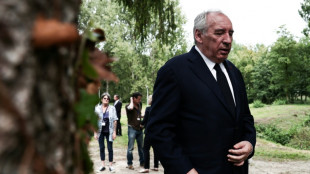 French political turmoil sends European stocks down, Wall Street edges up
French political turmoil sends European stocks down, Wall Street edges up
-
Sinner, Swiatek romp through at US Open

-
 Meta to back pro-AI candidates in California
Meta to back pro-AI candidates in California
-
Yankees-Giants set for earliest US MLB opener in 2026 schedule

-
 Messi will be game-day decision for Miami in Leagues Cup semis
Messi will be game-day decision for Miami in Leagues Cup semis
-
'Swiftie' Swiatek swats Arango, talks Taylor & Travis engagement

-
 SpaceX set once more for Starship test flight
SpaceX set once more for Starship test flight
-
Sinner begins US Open defence with quick win

-
 Who is Lisa Cook, the Fed governor Trump seeks to fire?
Who is Lisa Cook, the Fed governor Trump seeks to fire?
-
Masters updates qualifying criteria to add six national opens

-
 New era unlocked: Taylor Swift and Travis Kelce announce engagement
New era unlocked: Taylor Swift and Travis Kelce announce engagement
-
Trump to seek death penalty for murders in US capital

-
 Taylor Swift and Travis Kelce announce engagement
Taylor Swift and Travis Kelce announce engagement
-
Swiatek swats Arango, Sinner launches US Open defence

-
 Swiatek swats Arango to reach US Open second round
Swiatek swats Arango to reach US Open second round
-
Tokyo-bound Duplantis, Lyles headline Diamond League finals

-
 Trump joins backlash against US restaurant Cracker Barrel
Trump joins backlash against US restaurant Cracker Barrel
-
US revokes visa of Brazil justice minister in Bolsonaro row

-
 Leverkusen sign former Real Madrid defender Vazquez
Leverkusen sign former Real Madrid defender Vazquez
-
India's Sindhu eyes medal on return to Paris for badminton worlds

-
 British rider Turner wins Vuelta sprint as Gaudu takes race lead
British rider Turner wins Vuelta sprint as Gaudu takes race lead
-
Sci-fi skies: 'Haboob' plunges Phoenix into darkness
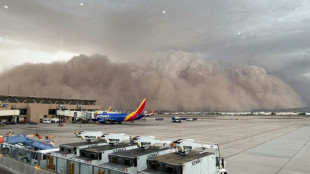

Nightlife falls silent as Ecuador's narco gangs take charge
The sweat-and-salsa-infused nightlife that was once the beating heart of Ecuador's largest city, Guayaquil, has fallen silent, with bars, restaurants, and nightclubs pulling down the shutters to avoid cartel-linked violence.
As Ecuador has become an epicenter of the global cocaine trade -- and the port city of Guayaquil a major thoroughfare -- cartels and mafias have chewed through the city's lively 'Zonas Rosas' -- nightlife hotspots.
Valeria Buendia, a 36-year-old teacher, used to hit Panama Street about once a week with friends.
A once buzzing and steamy area not far from the river, it is now empty after dark.
She rattles off the names of old haunts -- Central, Exflogia, Nicanor -- but now, she said, "it's become dangerous."
"I'm afraid of stray bullets," she said.
With over 5,200 homicides recorded so far this year, according to the government's tally, Ecuador has become the most dangerous country in South America.
More than 1,550 of those deaths -- roughly a third -- happened in Guayaquil, home to about 2.8 million people and the nation's commercial hub.
The bloodshed has been keenly felt on Panama Street.
The neon lights, music, and uninhibited dancers have moved to luxurious neighborhoods on the outskirts, accessible only to the fortunate few.
A 20-minute drive away in the upscale peninsula enclave of Samborondon, rich Ecuadorans can still enjoy a night out.
There, rifle-wielding guards protect high-heeled women and well-tailored men as they pass by metal detectors.
One nightclub owner who moved to Samborondon from the center laments: "It would be suicide to invest in Guayaquil" today.
- 'I couldn't keep up' -
The bar owners who are left behind have to live with threats and extortion.
One former bar owner, who asked for anonymity for fear of reprisals, told AFP how extortion had destroyed his livelihood.
"At first, they asked for $50 a week, then $100, and it kept increasing until I couldn't keep up," he said.
Tired of paying protection money to keep his business running, the owner of a salsa nightclub in the center closed his venue in December 2024.
He estimates it cost him "about $10,000." He now drives a taxi.
Locals say most bars have to pay $300 a month, or up to $5,000 for large venues. Many payments go through the banking system, and are paid by bank transfer.
- When night falls -
In the first half of 2025, Ecuador registered 9,422 formal complaints of extortion. About a third of those were in Guayaquil.
That likely significantly underplays the real number, since it's unknown how many people are too fearful to go to the authorities.
A businessman with a quarter-century of experience in the hospitality sector remembered receiving an extortion message in 2021.
"I was stunned; I called my wife because they had mentioned my family," he said.
He never reported the case to authorities and chose to close his establishment.
Those who do not pay face consequences.
The businessman remembers a restaurant in the Urdesa area of Guayaquil that had a suitcase containing explosives thrown at it as a warning in July.
The police managed to defuse it before it exploded.
In May, ten people were gunned down in a nightclub, and three months later, an armed attack in a bar killed one and injured three.
Ernesto Vasquez, of the city's nightclub association, estimates that 50 percent of the hundreds of bars in the city's center and south have closed.
Drug gangs continue to grow more emboldened, despite President Daniel Noboa's strategy of confronting them militarily.
D.Schaer--VB
